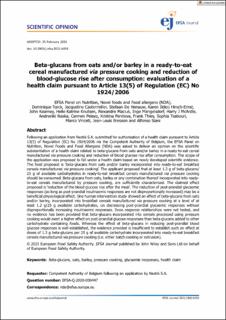Beta-glucans from oats and/or barley in a ready-to-eat cereal manufactured via pressure cooking and reduction of blood-glucose rise after consumption: evaluation of a health claim pursuant to Article 13(5) of Regulation (EC) No 1924/2006
Turck, Dominique; Castenmiller, Jacqueline; De Henauw, Stefaan; Hirsch-Ernst, Karen Ildico; Kearney, John; Knutsen, Helle Katrine; Maciuk, Alexandre; Mangelsdorf, Inge; McArdle, Harry J.; Naska, Androniki; Pelaez, Carmen; Pentieva, Kristina; Thies, Frank; Tsabouri, Sophia; Vincenti, Marco; Bresson, Jean-Louis; Siani, Alfonso
Peer reviewed, Journal article
Published version
Permanent lenke
https://hdl.handle.net/11250/3009444Utgivelsesdato
2021Metadata
Vis full innførselSamlinger
- Artikler [5068]
- Publikasjoner fra CRIStin FHI [7544]
Sammendrag
Following an application from Nestle S.A. submitted for authorisation of a health claim pursuant to Article13(5) of Regulation (EC) No 1924/2006viathe Competent Authority of Belgium, the EFSA Panel onNutrition, Novel Foods and Food Allergens (NDA) was asked to deliver an opinion on the scientificsubstantiation of a health claim related to beta-glucans from oats and/or barley in a ready-to-eat cerealmanufacturedviapressure cooking and reduction of blood glucose rise after consumption. The scope ofthe application was proposed to fall under a health claim based on newly developed scientific evidence.The food proposed is‘beta-glucans from oats and/or barley incorporated into ready-to-eat breakfastcereals manufacturedviapressure cooking’. The applicant proposed that at least 1.3 g of beta-glucans/25 g of available carbohydrates in ready-to-eat breakfast cereals manufacturedviapressure cookingshould be consumed. Beta-glucans from oats, barley or any combination thereof incorporated into ready-to-eat cereals manufactured by pressure cooking, are sufficiently characterised. The claimed effectproposed is‘reduction of the blood glucose rise after the meal’. The reduction of post-prandial glycaemicresponses (as long as post-prandial insulinaemic responses are not disproportionally increased) may be abeneficial physiological effect. One human intervention study showed an effect of beta-glucans from oatsand/or barley, incorporated into breakfast cereals manufacturedviapressure cooking at a level of atleast 1.2 g/25 g available carbohydrates, on decreasing post-prandial glycaemic responses withoutdisproportionally increasing insulinaemic responses. Dose–response relationships were not tested, andno evidence has been provided that beta-glucans incorporated into cereals processed using pressurecooking would exert a higher effect on post-prandial glucose responses than beta-glucans added to othercarbohydrate containing foods. Whereas the effect of beta-glucans in reducing post-prandial bloodglucose responses is well established, the evidence provided is insufficient to establish such an effect atdoses of 1.3 g beta-glucans per 25 g of available carbohydrate incorporated into ready-to-eat breakfastcereals manufactured via pressure cooking (i.e. either batch cooking or extrusion).
